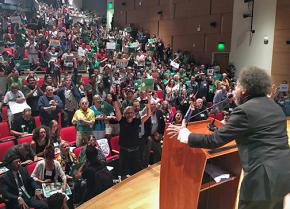A new road ahead for the Green Party
and report from Houston on the Greens' convention.
THE GREEN Party held its national convention on August 4-7 in Houston, where Dr. Jill Stein and Ajamu Baraka were nominated to be the party's presidential and vice presidential candidates.
Though Stein was one of several contenders for the nomination, she was the party's presidential candidate in 2012 and the far-and-away favorite to get the nomination again. Stein and the Greens have already gained national attention in media coverage of the presidential race, all the more so after Bernie Sanders' outsider campaign for the Democratic nomination came up short and his millions of supporters consider their options in November.
For obvious reasons, the Stein campaign was center stage at the Houston convention, but there were other exciting developments for the Green Party.
The energy and enthusiasm brought to the convention by former Sanders supporters--some estimated as many as 100 or more registered after the Democratic convention in late July and traveled to Houston to attend--was palpable. A longtime Green Party member said this year's event was the party's "biggest and youngest."

The convention also saw the passage of an amendment to the party platform making the Greens an explicitly anti-capitalist party for the first time, and the influence of movements like Black Lives Matter made issues of white supremacy and fighting racism central.
AN OPENING night speech to the convention by YahNé Ndgo highlighted the significance of former Bernie Sanders supporters in infusing the Green Party with new energy and vision.
Ndgo, a writer, singer, activist and mother from Philadelphia, came into the national spotlight after she was interviewed on CNN to speak out for the "Bernie or Bust" sentiment among Sanders supporters.
In Houston, she talked about how after considering herself a Democratic voter for close to 20 years, she no longer would remain "loyal to any single party." As a Black woman, Ndgo explained that the Democratic Party took her vote for granted.
The Sanders campaign, Ndgo said, inspired people like her to participate in a movement against inequality, but she realized following the Democratic convention that such a movement wouldn't come from inside the Democratic Party. As she asked: "You have a party full of billionaires trying to come up with solutions for poverty? How are they going to do that?"
Such sentiments from former Sanders supporters were expressed throughout the convention. Tina Michel, a resident of the greater Houston area and longtime supporter of the Democrats, said she "felt the Bern," but that it was "time to move on. I'm done voting for the lesser of two evils."
Green Party members around the country say the organization saw an influx of support and interest from ex-Sanders supporters. Shane Heyden, a delegate from Seattle, said Green Party meetings "went from one or two people to close to 30" after the Democratic convention--evidence, he said, of former Sanders supporters ready to support an alternative to the politics of lesser evilism.
Likewise, Charles Ostdiek, a delegate from Omaha, described "a great influx of volunteers and members" from Sanders supporters who wanted to make sure Jill Stein got ballot access in Nebraska. Thanks to these volunteers, Ostdiek said, the Greens were able to turn in three times the required number of signatures to get Stein on the ballot.
MANY GREEN Party members also celebrated this year's convention for adopting Platform Amendment 835, which makes the Greens' platform explicitly anti-capitalist by replacing old language endorsing "responsible stakeholder capitalism" with text calling for "an alternative economic system" based on "workplace and community democracy."
Ursula Rozum, co-chair of the Young Greens and secretary of the New York Green Party, said the amendment was co-sponsored by several state Green Parties and caucuses, and reflected the reality that "you cannot have a green economy based on exploitation."
Rozum said several developments made it possible to pass the amendment. For one, the Sanders campaign made "socialism" a part of the mainstream discussion, and probably shifted some party leaders who previously feared an outright anti-capitalist position would marginalize the organization.
More importantly, said Rozum, the participation of Green Party members in coalitions like System Change Not Climate Change, among others, helped build the confidence and political will among rank-and-file members in support of the amendment.
Other youth at the convention confirmed the sentiment that socialism was and needed to be on any political agenda for the Greens.
"As a young worker, a parent and a queer person, I'm extremely excited that the Green Party of the United States is now the largest anti-capitalist party in the country," Sean Friend, a delegate from Colorado, said. "Greens always stood for economic justice in our core values. This makes it explicit and allows us to make coalitions among the left."
In general, younger convention attendees not only expressed support for socialism as the alternative worth fighting for, but brought high levels of energy and enthusiasm to the proceedings. Although many are new to the party--the Young Greens caucus itself only formed in 2012--this is promising.
Rozum said that to build on the success of the convention, the Young Greens would emphasize training this new layer of activists and members politically in order to prepare them for leadership positions, to be successful in future election campaigns, and to continue building the party and working with the broader left.
Hopefully, the Green Party's convention can help the organization boost the activities of the Stein campaign heading toward the election, where the Green candidate will be the main left-wing alternative independent of the Democrats. As YahNé Ndgo said in her opening speech: "Everything that we can imagine is possible...We must strategize to win!"


